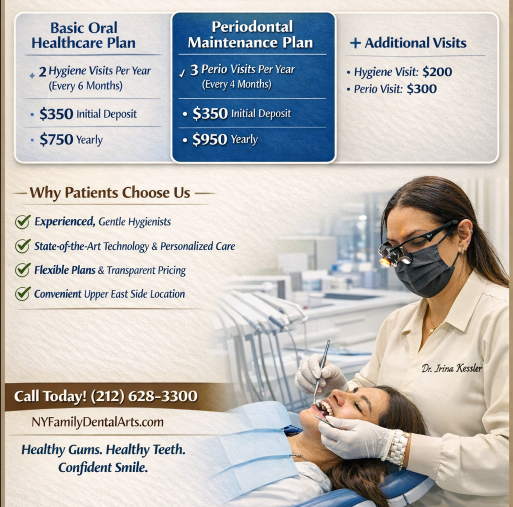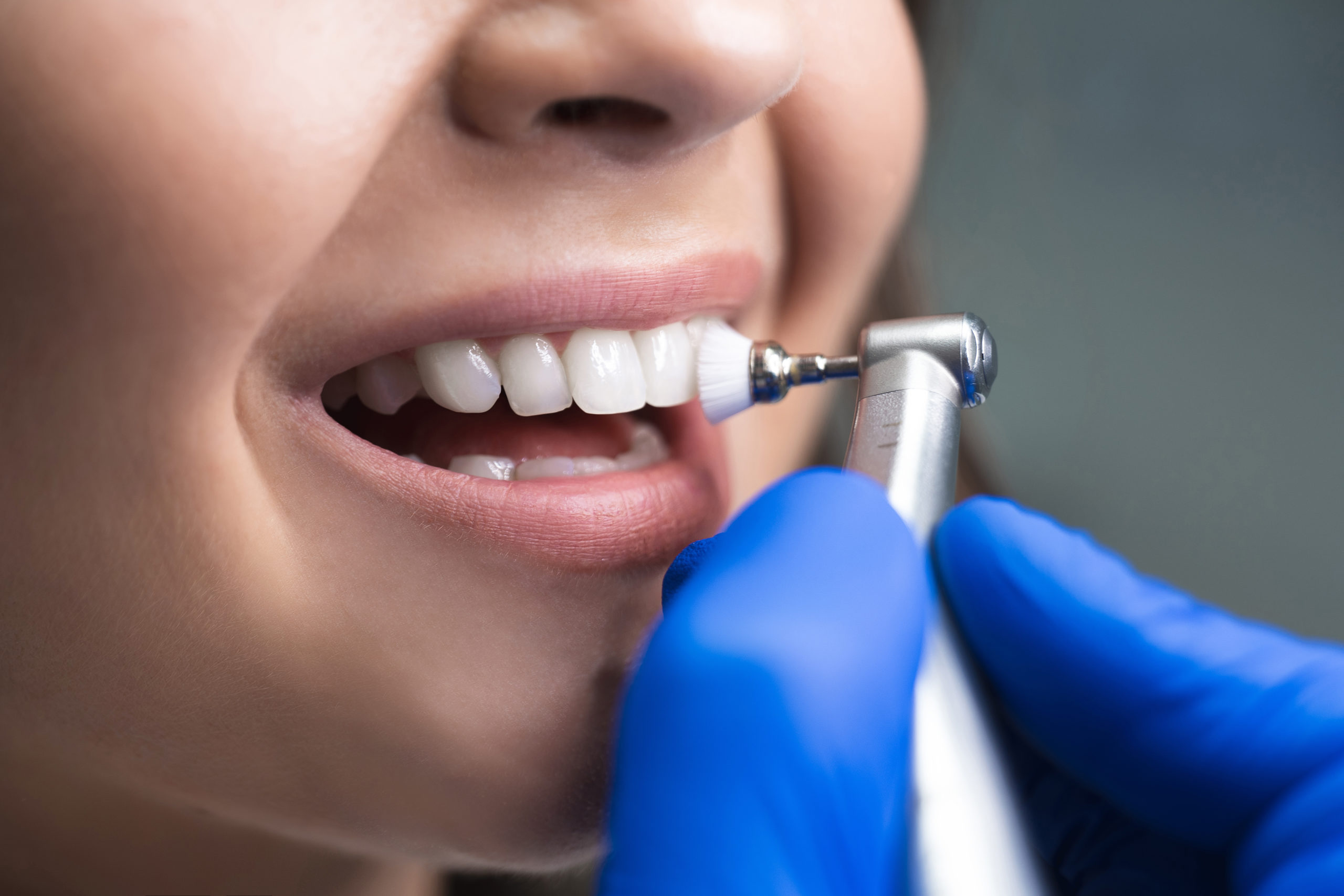What happens during a dental (teeth) cleaning? A dental cleaning, also known as prophylaxis, is a routine dental procedure performed by a dental hygienist or a dentist. The procedure typically involves the following steps: Assessment: Before the cleaning, the dental professional will examine your teeth and gums to identify any areas of concern, such as signs of gum disease or tooth decay. Removal of plaque and tartar: Plaque is a sticky film of bacteria that forms on the teeth and can cause tooth decay and gum disease if not removed regularly. Tartar, or calculus, is hardened plaque that cannot be removed with brushing and flossing alone. The dental professional will use special tools, such as a scaler, to remove plaque and tartar from your teeth and around your gum line. Cleaning and polishing: After the plaque and tartar have been removed, the dental professional will use a gritty toothpaste and a polishing tool to clean and polish your teeth. This helps remove surface stains and leaves your teeth feeling smooth and clean. Flossing: The dental professional will floss your teeth to remove any remaining plaque or food particles from between your teeth. Fluoride treatment: Finally, the dental professional may apply a fluoride treatment to your teeth to help strengthen the enamel and protect against tooth decay. The entire cleaning process typically takes between 30 minutes to an hour, depending on the extent of cleaning required. It is recommended that you get a dental cleaning every six months to maintain good oral health.
During a typical dental hygiene visit, you can expect the following: Medical history update: Your dental hygienist or dentist will ask you about any changes in your medical history since your last visit. It is important to provide accurate and up-to-date information to ensure the safety and effectiveness of your treatment. Examination: Your hygienist or dentist will examine your teeth and gums to check for any signs of decay, gum disease, or other dental problems. They may use tools such as a dental mirror and probe to examine your teeth and gums. Cleaning: Your hygienist will use special instruments to remove plaque and tartar from your teeth, including those hard-to-reach areas between teeth and below the gum line. They may also use a polishing tool to remove surface stains and make your teeth feel smooth. Flossing: Your hygienist will floss your teeth to remove any remaining plaque or debris between your teeth. Fluoride treatment: A fluoride treatment may be applied to your teeth to help prevent tooth decay and strengthen the enamel. Oral hygiene education: Your hygienist will provide you with education and tips on how to properly care for your teeth and gums at home, including brushing techniques, flossing, and dietary recommendations. X-rays: Depending on your individual needs and dental history, your dentist may recommend taking dental x-rays to check for any problems that are not visible during the clinical examination. Overall, a dental hygiene visit is a comprehensive and essential part of maintaining good oral health. It is important to attend regular hygiene appointments as recommended by your dentist or hygienist to ensure the health of your teeth and gums.

On most occasions you visit the hygienist for your regular six monthly cleaning, it’s likely that this is the treatment you will receive. Patients with good dental health, who are not undergoing a treatment plan, will receive an overall check of the health and hygiene of the mouth every six months, and a thorough clean, especially in any hard to reach areas. Your hygienist will ensure the gum line is free of tartar, and polish teeth to shine, brighten, and lift away any staining or discoloration. The hygienist will pay particular attention to the stability of the teeth’s roots in the gum, and ensure there are no signs of gum disease, such as bleeding, or indication of other anomaly.
Thorough cleanings from our hygienist
Preventive approach to your dental and gum health
Bio-compatible tooth colored fillings and restorations
When you come to us for your first visit, Dr Vaiman or Dr. Kessler will always make sure that your dental exam is comprehensive and complete. A comprehensive dental exam includes a regular dental checkup and teeth cleaning and teeth cleaning. We will provide you with the following:
Oral cancer screening: Dr.Vaiman or Dr Kessler will examine your face, lips, neck, throat, tissues, gums, lips, tongue, throat, tissues, and gums for any signs of oral cancer.
Digital X-rays: These x-rays are low in radiation and x rays your mouth only with no radiation going to other organs, Dr. Vaiman or Dr Kessler will examine your x-rays in order to evaluate areas of decay, cysts, tumors and will examine your bone loss, while noting your tooth and positions of your roots.
Evaluation of your level of gum disease: Dr Vaiman or Dr Kessler will carefully check your gums and the surrounding bone around your teeth, looking for any signs of gingivitis or the more severe form of periodontal disease, known as periodontitis. We will probe six different spots around each one of your teeth. We do this to every patient on every visit. When we do these probings we archive them as reference points at each subsequent visit.

Evaluation and examination of tooth decay: During this evaluation we will make sure that we inspect all of your tooth surfaces for any signs of decay using special dental instruments. Evaluation and examination of existing dental restorations: During this process we will check your dental fillings, dental crown etc., We will make sure that all restorations are functioning properly to make sure that they are doing the job.
We are sensitive and understanding dental professionals who realize that not everybody is comfortable going to the dentist even if it is a regular cleaning. Are injections and fillings painless? If fillings are needed, our dentists will numb the area with a painless injection, then fill the cavity with a tooth-colored composite.
There is now no need for dark, silver fillings as we now use composite white fillings, also known as cosmetic fillings. These tooth-colored ceramic materials that we use are safe and extremely durable, and both Dr. Vaiman and Dr. Kessler able to custom color the filling or crown to match your natural teeth.
The traditional way to detect tooth decay was by touching the surface of the teeth with a metal probe. If the metal probe stuck, then there was a cavity. Using new laser technology, our dentists can detect early tooth decay without taking the chance of missing even the smallest cavities.
Our hygienists will make sure that your cleaning is gentle and thorough. We are sensitive and understanding dental professionals who realize that not everybody is comfortable going to the dentist even if it is a regular cleaning.
If fillings are needed, our dentists will numb the area with a painless injection, then fill the cavity with a tooth-colored composite. There is now no need for dark, silver fillings as we now use composite white fillings, also known as cosmetic fillings. These tooth-colored ceramic materials that we use are safe and extremely durable, and both Dr. Vaiman and Dr. Kessler able to custom color the filling or crown to match your natural teeth.
Make an appointment to see our dental hygienist. Discuss any concerns that you have keeping your teeth clean. In the future try and see the dental hygienist every 6 months in order to maintain optimal dental health and allows us to keep an eye on any developing problems.